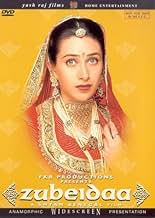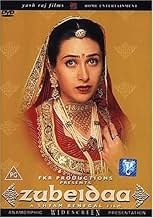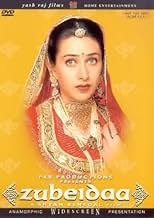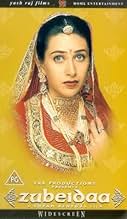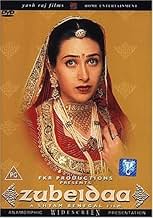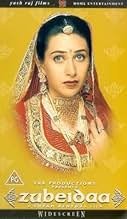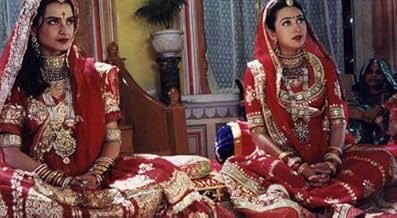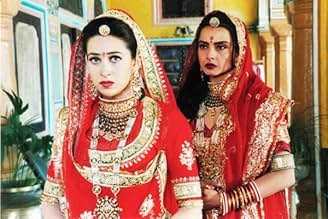IMDb RATING
6.6/10
1.8K
YOUR RATING
Zubeidaa, an aspiring Muslim actress, marries a Sikh prince to become his second wife. Her tumultuous relationship with her husband, and her inner demons lead her to a decision which has fat... Read allZubeidaa, an aspiring Muslim actress, marries a Sikh prince to become his second wife. Her tumultuous relationship with her husband, and her inner demons lead her to a decision which has fatal consequences for them all.Zubeidaa, an aspiring Muslim actress, marries a Sikh prince to become his second wife. Her tumultuous relationship with her husband, and her inner demons lead her to a decision which has fatal consequences for them all.
- Awards
- 3 wins & 15 nominations total
Manoj Bajpayee
- Raja Vijendra Singh
- (as Manoj Bajpai)
Rajit Kapoor
- Riyaz Masud
- (as Rajit Kapur)
- Director
- Writers
- All cast & crew
- Production, box office & more at IMDbPro
Featured reviews
Shyam Benegal is an international award winning film director who made his name in the 1970's with films, such as Anker (1974), that focus on controversial subjects involving the examination of fraught, complex social and cultural relationships. These films tend to concentrate on the lower rungs of Indian society. Zubeidaa is a refreshing update in this mode of film-making, as Benegal transfers his name-making qualities to a subject at the higher end of society.
It is the story of a young man, Riyaz, who goes on a journey to discover what has happened to his mysterious mother, absent for as long as he can remember. What he discovers is reenacted in scenes set not long after independence, as the naïve but headstrong young Zubeidaa is scandalised by her romance, and subsequent marriage to Prince Vijayendra Singh of Fatehpur, head of a grand Hindu ruling royal family. As a middle class Muslim divorcée with a child by another man, her relationship with the Prince is naturally complicated by socio-political and religious factors.
But not only does she become entangled in the politics of the royal circle around the Prince, particularly in her relationship with the Prince's first wife, Mandira Devi, she also gets caught up in the larger politics of India. The film is set during a time not long after Independence, a time of change and uncertainty for the traditional ruling class of India, which still laid claim to about a third of the country.
Though it is clear that this film is much more than royal watching, having such a subject naturally supports a lavish treatment, which Benegal ably supplies, as well as making the film's content rich in nuance and resonance, handling its mature romantic storyline gracefully, and skilfully embedding it into its larger historical context.
The characters are generally very well developed with empathy and without judgement or cliché. The acting matches this. Karisma Kapoor captures the strength and naivety of Zubeidaa with aplomb, and Rekha is authoritative and understated as the enigmatic Mandira Devi.
The only problem I have with the film is Zubeidaa's grown son, Riyaz. Riyaz is imperative to the film, since the viewer follows him on his journey of discovery. Seeing great characters through the eyes of other characters is a useful fictional device, most successfully utilised in Scott Fitzgerald's novel, The Great Gatsby. Nick Carraway's character is revealed by his journey in discovering Gatsby. However, in Zubeidaa, Riyaz stays enigmatic while discovering his mother, and even, at times, comes across as anodyne, feeling more like a biographer looking into an interesting episode in history, not a son trying to find his mother. Rajat Kapoor, playing Riyaz, does not manage to rise above his character's failings. And so, unfortunately, the film ends up feeling incomplete.
It is the story of a young man, Riyaz, who goes on a journey to discover what has happened to his mysterious mother, absent for as long as he can remember. What he discovers is reenacted in scenes set not long after independence, as the naïve but headstrong young Zubeidaa is scandalised by her romance, and subsequent marriage to Prince Vijayendra Singh of Fatehpur, head of a grand Hindu ruling royal family. As a middle class Muslim divorcée with a child by another man, her relationship with the Prince is naturally complicated by socio-political and religious factors.
But not only does she become entangled in the politics of the royal circle around the Prince, particularly in her relationship with the Prince's first wife, Mandira Devi, she also gets caught up in the larger politics of India. The film is set during a time not long after Independence, a time of change and uncertainty for the traditional ruling class of India, which still laid claim to about a third of the country.
Though it is clear that this film is much more than royal watching, having such a subject naturally supports a lavish treatment, which Benegal ably supplies, as well as making the film's content rich in nuance and resonance, handling its mature romantic storyline gracefully, and skilfully embedding it into its larger historical context.
The characters are generally very well developed with empathy and without judgement or cliché. The acting matches this. Karisma Kapoor captures the strength and naivety of Zubeidaa with aplomb, and Rekha is authoritative and understated as the enigmatic Mandira Devi.
The only problem I have with the film is Zubeidaa's grown son, Riyaz. Riyaz is imperative to the film, since the viewer follows him on his journey of discovery. Seeing great characters through the eyes of other characters is a useful fictional device, most successfully utilised in Scott Fitzgerald's novel, The Great Gatsby. Nick Carraway's character is revealed by his journey in discovering Gatsby. However, in Zubeidaa, Riyaz stays enigmatic while discovering his mother, and even, at times, comes across as anodyne, feeling more like a biographer looking into an interesting episode in history, not a son trying to find his mother. Rajat Kapoor, playing Riyaz, does not manage to rise above his character's failings. And so, unfortunately, the film ends up feeling incomplete.
Shyam Benegal is not generally associated with opulent cinema. So when, I saw the trailers of this movie, which boasted of Shyam Benegal's direction, Khalid Mohammad's story, A.R.Rahman's music & Karishma Kapoor's acting, I was quite intrigued. Little did I know that the memory of Zubeidaa would haunt me in the years to come.... Zubeidaa, without a doubt, is one of the finest Indian films I've ever seen. Why??? Well, here are 10 reasons:
1) Zubeidaa was like a breath of fresh air in 2001 when the landscape of Bollywood was pathetically repetitive. A beautiful and a poignant story with an equally brilliant screenplay is the backbone of the film.
2) Shyam Benegal is able to re-create the magic of the 50s & the 60s. Right from the minutest detail in the frame till the most trivial gestures of the actors...it all oozes the rich sophistication of the bygone era.
3) The sets, the costumes, the props.... You cant help but notice the ocean green eyes of Karishma, the luscious red sarees, the whole mood was jussssst right!
4) A.R.Rahman's haunting music paired with Javed Akhtar's lyrics give you some very unforgettable moments in the movie.
5) Beautiful characters.... The patriarch Amrish Puri, the meek Sulekha Sikri, the suave Vajpayee, the very elegant Rekha. But the limelight is on Karishma Kapoor, whose complex character haunts you....
In the name of good cinema, please watch Zubeidaa!
1) Zubeidaa was like a breath of fresh air in 2001 when the landscape of Bollywood was pathetically repetitive. A beautiful and a poignant story with an equally brilliant screenplay is the backbone of the film.
2) Shyam Benegal is able to re-create the magic of the 50s & the 60s. Right from the minutest detail in the frame till the most trivial gestures of the actors...it all oozes the rich sophistication of the bygone era.
3) The sets, the costumes, the props.... You cant help but notice the ocean green eyes of Karishma, the luscious red sarees, the whole mood was jussssst right!
4) A.R.Rahman's haunting music paired with Javed Akhtar's lyrics give you some very unforgettable moments in the movie.
5) Beautiful characters.... The patriarch Amrish Puri, the meek Sulekha Sikri, the suave Vajpayee, the very elegant Rekha. But the limelight is on Karishma Kapoor, whose complex character haunts you....
In the name of good cinema, please watch Zubeidaa!
A vision of female follies & desires SHYAM Benegal spearheaded the parallel cinema movement in the 70s and the 80s with movies like Nishant and Manthan whereby making icons of Shabana Azmi, Naseeruddin Shah and Smita Patil. His genuine concern with womens' issues is evident in movies like Mammo and Sardari Begum (both scripted by Khalid Mohammad) with their women-oriented themes. His latest film Zubeidaa offers perspective vignettes and explores the female psyche and interaction in different environments. Benegal has a kindly vision of female follies and characters, their motivations, desperation's and desires.
Starring Karisma Kapur, Rekha and Manoj Bajpai, the film has strong a backup in Surekha Sikri and Lillette Dubey, supported by his favorites Amrish Puri and Rajit Kapur, Shyam Benegal calls his film a "lyrical romance" and it is one, but that is not all that his film offers. The film, a period romance set in the 1950s, is the story of a young Muslim girl from an affluent family. When her father discovers that his daughter has signed a film, he forces her into a marriage which ends in a divorce and a baby. Zubeidaa meets her true love, a Rajasthani prince (Manoj Bajpai) but the trouble is that he is already married. However, she consents to becoming his Chhoti Rani.
Basically there are four strongly etched characters in the film. Surekha Sikri is the Muslim wife in an urban, educated setting who abides by the laws set down by the husband and accepts his tyranny as a traditional male domain, "you know sahib always has his way. You'll have to do what he says in the end". Her contemporary is Lillette Dubey who plays Miss Rose Davenport, a dancer in the movies and she's utterly irrepressible! Out to have a good time, she interacts on a superficial level with everyone connected to her. Still she has a kind heart and when she decides that Zubeidaa has had enough of moping around after her divorce, she promptly introduces her to the dashing prince and shamelessly abets the romance. Her statement, "men and horses are more my style my dear", (said with a mischievous wink) is completely her! The interesting thing is that the same fact, when examined by her and by Sikri, portrays diametrically different views of the truth making one realize that truth is never absolute! These two utterly different women, belonging to the same generation, remain true to type till their old age.
Karisma Kapoor and Rekha in Zubeidaa Benegal is never judgmental and nor does he allow the audience to become holier-than-thou. So human are both the women and so sympathetically has the director dealt with his characters that one simply accepts them and likes them.
The main character, that of Zubeidaa, superbly portrayed by Karisma Kapur, has overlapping shades to it. Zubeidaa has fiery feminist instincts and is rebellious and tempestuous until the end. At the same time she's feminine, vulnerable and very young. She chooses to live her life the way she wants to. After giving into paternal authority once in her first marriage, she isn't willing to throw away her chance for happiness the second time. Fully aware of the prince's previous marriage and family, she's ready to accept a strange environment and a different religion for the sake of love. She makes her choices and sacrifices willingly and knowingly. Karisma has surpassed herself as the passionate, defiant, willful and troubled Zubeidaa, the truly modern woman.
In direct contrast to her is Mandira Devi, the Patrani of the prince. Graceful, mature and traditional, she upholds the role and duties of the Rajasthani princess, yet surprises Zubeidaa by saying, "call me Mandy". She treats Zubeidaa with resigned, amused affection, never losing her savor-fare while she instructs Zubeidaa in her expected role.
The most important facet that Benegal has been able to bring out through the film is the fact of female bonding. Whether it is Lillette with Karisma or Karisma with Surekha or Karisma with Rekha, females in the film interact, react, exist and equate with each other, despite the parameters set by males. They understand and accept each others' drives and emotions. Rekha and Karisma, in fact, have a frank discussion about their respective relationships with the prince. Both accept that they have a different role to play in his lifebut in the final analysis, that role is assigned by the male. So if the prince says of his senior wife, "woh eek ache Rajput bah ha", he says to Karisma, "sada ha seen bane Rana Ur Dill belling", leaving no ambiguity in the respective role expectation.
The plot of the story moves fast from scene to scenefrom the 50s to the 80s (the film is in a series of flash-backs) without losing track of the story. It is also not so 'period' that one cannot relate to it. There are traces of the British upper class manners,egg. The meals and decor in Karisma's house is very Anglicized, people speak English comfortably, on the stereo a Dean Martin song is playing, in a party is a live band with the saxophone, trumpet and drums playing a waltz. There are puff sleeves, shingled hair and net depots, there is talk of the newly-formed Pakistan, the Privy-purses being withdrawn is a burning issue and many details like these to make the setting completely authentic. Back home in Fatehpur too, the true Rajasthani setting has been portrayed with attention to minute detail.
In the final analysis, Benegal has made a film which is a milestone as far as women-oriented movies are concerned. The theme, characterization and issues that the film examines are fair to women and have been examined without any searing criticism to mar the tone of the picture.
Starring Karisma Kapur, Rekha and Manoj Bajpai, the film has strong a backup in Surekha Sikri and Lillette Dubey, supported by his favorites Amrish Puri and Rajit Kapur, Shyam Benegal calls his film a "lyrical romance" and it is one, but that is not all that his film offers. The film, a period romance set in the 1950s, is the story of a young Muslim girl from an affluent family. When her father discovers that his daughter has signed a film, he forces her into a marriage which ends in a divorce and a baby. Zubeidaa meets her true love, a Rajasthani prince (Manoj Bajpai) but the trouble is that he is already married. However, she consents to becoming his Chhoti Rani.
Basically there are four strongly etched characters in the film. Surekha Sikri is the Muslim wife in an urban, educated setting who abides by the laws set down by the husband and accepts his tyranny as a traditional male domain, "you know sahib always has his way. You'll have to do what he says in the end". Her contemporary is Lillette Dubey who plays Miss Rose Davenport, a dancer in the movies and she's utterly irrepressible! Out to have a good time, she interacts on a superficial level with everyone connected to her. Still she has a kind heart and when she decides that Zubeidaa has had enough of moping around after her divorce, she promptly introduces her to the dashing prince and shamelessly abets the romance. Her statement, "men and horses are more my style my dear", (said with a mischievous wink) is completely her! The interesting thing is that the same fact, when examined by her and by Sikri, portrays diametrically different views of the truth making one realize that truth is never absolute! These two utterly different women, belonging to the same generation, remain true to type till their old age.
Karisma Kapoor and Rekha in Zubeidaa Benegal is never judgmental and nor does he allow the audience to become holier-than-thou. So human are both the women and so sympathetically has the director dealt with his characters that one simply accepts them and likes them.
The main character, that of Zubeidaa, superbly portrayed by Karisma Kapur, has overlapping shades to it. Zubeidaa has fiery feminist instincts and is rebellious and tempestuous until the end. At the same time she's feminine, vulnerable and very young. She chooses to live her life the way she wants to. After giving into paternal authority once in her first marriage, she isn't willing to throw away her chance for happiness the second time. Fully aware of the prince's previous marriage and family, she's ready to accept a strange environment and a different religion for the sake of love. She makes her choices and sacrifices willingly and knowingly. Karisma has surpassed herself as the passionate, defiant, willful and troubled Zubeidaa, the truly modern woman.
In direct contrast to her is Mandira Devi, the Patrani of the prince. Graceful, mature and traditional, she upholds the role and duties of the Rajasthani princess, yet surprises Zubeidaa by saying, "call me Mandy". She treats Zubeidaa with resigned, amused affection, never losing her savor-fare while she instructs Zubeidaa in her expected role.
The most important facet that Benegal has been able to bring out through the film is the fact of female bonding. Whether it is Lillette with Karisma or Karisma with Surekha or Karisma with Rekha, females in the film interact, react, exist and equate with each other, despite the parameters set by males. They understand and accept each others' drives and emotions. Rekha and Karisma, in fact, have a frank discussion about their respective relationships with the prince. Both accept that they have a different role to play in his lifebut in the final analysis, that role is assigned by the male. So if the prince says of his senior wife, "woh eek ache Rajput bah ha", he says to Karisma, "sada ha seen bane Rana Ur Dill belling", leaving no ambiguity in the respective role expectation.
The plot of the story moves fast from scene to scenefrom the 50s to the 80s (the film is in a series of flash-backs) without losing track of the story. It is also not so 'period' that one cannot relate to it. There are traces of the British upper class manners,egg. The meals and decor in Karisma's house is very Anglicized, people speak English comfortably, on the stereo a Dean Martin song is playing, in a party is a live band with the saxophone, trumpet and drums playing a waltz. There are puff sleeves, shingled hair and net depots, there is talk of the newly-formed Pakistan, the Privy-purses being withdrawn is a burning issue and many details like these to make the setting completely authentic. Back home in Fatehpur too, the true Rajasthani setting has been portrayed with attention to minute detail.
In the final analysis, Benegal has made a film which is a milestone as far as women-oriented movies are concerned. The theme, characterization and issues that the film examines are fair to women and have been examined without any searing criticism to mar the tone of the picture.
Zubeidaa was a real person. Shyam Benegal has tried to portray her story through the movie. When Indian films graduated from the silent era to the talkies, Zubeida starred in the first Indian talkie - Alam Ara. She was a divorcee who fell in love with the then maharaja of Jodhpur. They got married but Zubeida never earned the status of a queen. She always remained the 'other woman'. Zubaida married the late Maharaja of Jodhpur Hanwant Singh, a high- flier who fell for her beauty. Both the Maharaja and Zubaida were killed in an air crash near Jodhpur 48 years ago. Their son, Hukum Singh, popularly known as Tutu Bana, was murdered fifteen years ago under mysterious circumstances at Jodhpur. Well known film journalist Khalid Mohammed, Zubaida's son from her first marriage, wrote a story on her late mother. Originally, it is a love story, but for the film version, little changes have been made. Now the film - Karishma Kapoor has matured as an actress. She was known as Govinda's heroine. Now with movies like Fiza and Zubeidaa, Karishma has shown that she can act. Rekha is wonderful in her short but important role as the King's elder wife, Mandira Devi. The only flaw I found was casting of Manoj Bajpai as the king. The Rajput kings were really majestic looking - tall and fair and very cultured. Manoj Bajpai did not have that in his personality though he made for it by his acting talent. This is not a typical Shyam Benegal film. People expecting a serious thought provoking movie would be disappointed. This is Shyam Benegal's first attempt to bridge the gap between Commercial cinema and the 'art' cinema.
The movie is a love story of a journalist talking to people trying to find out all he can about a mother he never knew. He meets people and through them Zubeidaa's story unfolds. I enjoyed the movie and give it 7 out of 10.
The movie is a love story of a journalist talking to people trying to find out all he can about a mother he never knew. He meets people and through them Zubeidaa's story unfolds. I enjoyed the movie and give it 7 out of 10.
Riveting performances. Strong female characters. Patriarchy and the position of women.
Did you know
- TriviaThe jewelry worn by Karisma Kapoor and Rekha in the film actually belonged to the Jaipur royal family. Both actresses were told to be very careful when wearing it.
- GoofsThe events of the movie are happening in the 1950s, around the time of decolonization, yet the prince Victor appears to be flying a 1982 model of Cessna 172.
- ConnectionsFeatured in Bollywood/Hollywood (2002)
- How long is Zubeidaa?Powered by Alexa
Details
- Runtime
- 2h 33m(153 min)
- Color
- Sound mix
- Aspect ratio
- 2.35 : 1
Contribute to this page
Suggest an edit or add missing content

